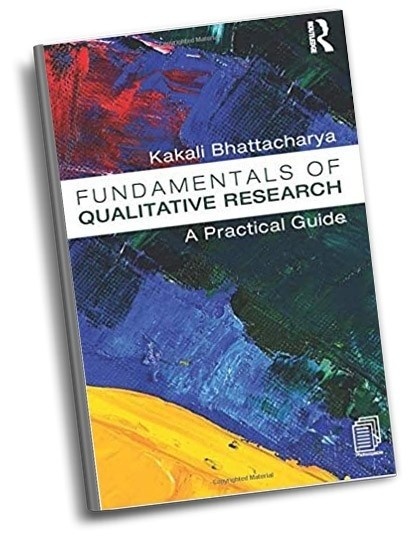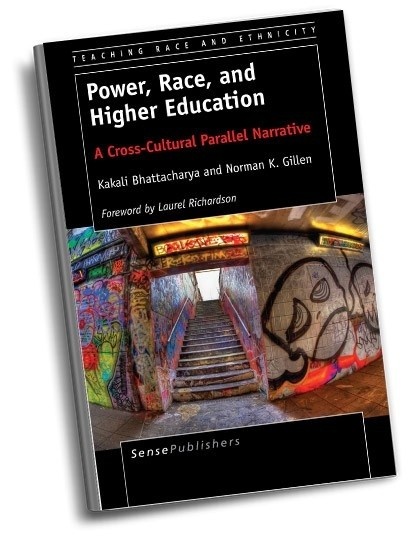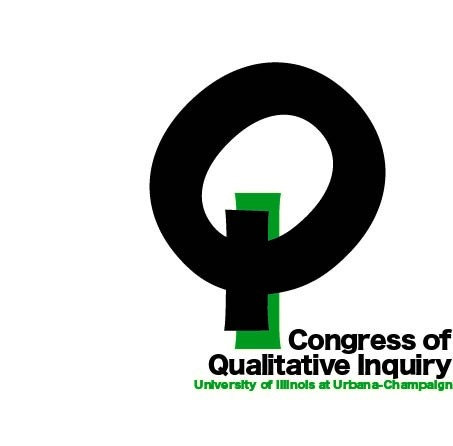DR. KAKALI'S BOOKS
Qualitative Research. Justice Oriented. Storyteller.
AWARDS:






FUNDAMENTALS OF QUALITATIVE RESEARCH: A PRACTICE GUIDE
This book is the road map to proficiency and development in the field of qualitative research. Borrowing from a wealth of experience teaching introductory qualitative research courses, author Kakali Bhattacharya lays out a dynamic program for learning different paradigms of inquiry, empowering students to recognize the convergence of popular research methodologies as well as the nuances and complexities that set each of them apart. Her book:
- supplements the readings and activities in a qualitative methods class, exposing students to the research process and the dominant types of qualitative research;
- introduces a variety of theoretical perspectives in qualitative research, including positivism and postpositivism, interpretivism, feminism, symbolic interactionism, phenomenology, hermeneutics, critical theory, and Critical Race Theory;
- identifies and summarizes the three dominant methodological approaches in qualitative research: narrative inquiry, grounded theory, and ethnography;
- provides interactive activities and exercises to help students crystallize their understanding of the different topics in each chapter.
ENDORSEMENTS

Fundamentals of Qualitative Research introduces students of qualitative research to the vast range of theories and methods used by qualitative researchers across disciplines. Written in a reader-friendly style, Kakali Bhattacharya’s book provides novices to qualitative research an up-to-date, informative, and accessible entrée to a range of ways to engage in qualitative research. Packed with practical activities, teaching tips, suggestions for additional reading, and reflective questions to help students make informed decisions as they design their projects, this book is an excellent resource for both newcomers to qualitative inquiry and their teachers.
- KATHRYN ROULSTON, Professor & Program Coordinator, Qualitative Research Program, Department of Lifelong Education, Administration, and Policy, University of Georgia
This is one of the most wanted pedagogical texts in qualitative research. Bhattacharya has masterfully put her imagination at work to create such an indispensable textbook for both fledgling qualitative researchers and teachers of qualitative research. The book thrives on the confluence of the dialectical nature: succinct but substantive; programmatic but theoretically grounded; structured but imaginative and inspirational. It is a must have for all of us in qualitative research.
- JEONG-HEE KIM, Ph.D., Professor of Curriculum Studies and Teacher Education, Department of Curriculum and Instruction, Texas Tech University


As someone who has been working to wrap their mind around qualitative inquiry for the past five years, I feel like this book is the inside track. In 204 pages, Bhattacharya accomplishes a descriptive overview, complete with a multitude of examples and thoughtful cautions, which seems to take other authors hundreds of pages. For the student who is new to this field, the length and manner of the book is inviting. This is certainly a text that would hold central position in any class I teach focused on qualitative research, and enough cannot be said for the of the way Bhattacharya sets up a ladder for us on the side of the ivory tower, and the focus is always on the meaning we derive from the work we do.
- JASON D, DEHART, Assistant Professor, Department of Reading Education and Special Education, Appalachian State University

POWER, RACE, AND HIGHER EDUCATION: A CROSS-CULTURAL PARALLEL NARRATIVE
Power, Race, and Higher Education is a parallel narrative written by two scholars. Kakali Bhattacharya, who is a South Asian woman who immigrated to the United States to pursue her graduate degrees and eventually became an academic. Kent Gillen is a White man who focuses on completing his doctoral studies under Kakali’s supervision. Kent comes to a crossroad where he has to interrogate his sociocultural position, how he benefits from a White supremacist system, even if he did not ask for any of the benefits or had his personal plights. Embedded in the dilemmas are implications for cross-cultural qualitative research, understanding of how whiteness functions, and how we attend to our deepest wounds as we work to become allies and build bridges.
This book can be used in undergraduate and graduate courses in race and culture studies in the social sciences and humanities, qualitative methods courses, and graduate classes that help students with writing up qualitative research. Individual graduate students and professors who advise graduate students may benefit from this text.
ORDER NOWAWARDS

2017 winner of Outstanding Publication Award from American Educational Research Association, SIG 168, Graduate and Post-Doctoral Education Across the Disciplines.
The purpose of this award is to bestow recognition on a colleague or colleagues for a specific publication (book, book chapter, or journal article) judged as making a substantial contribution to the literature and/or practice of graduate education. Publications may have more than one author. A substantial contribution is defined as scholarship that extensively revises our knowledge and understanding of a particular problem in the study of graduation education or looks at it in a new way. It may also be an interdisciplinary effort that identifies a problem new to the community of scholars in higher education.

2017 OutstandingBook Award from International Congress of Qualitative Inquiry.
This award recognizes books that make a major contribution to the study and practice of qualitative approaches through success in experimenting with new or traditional writing forms, inclusion of critical reflections on the writing and research process, contributions to living meaningful lives, and insights into creating a socially just world.
ENDORSEMENTS

Riveting, courageous, innovative and brave! This spell-binding book not only holds your attention, it holds you to account as you read a beautifully integrated narrative that weaves theory, research, artistry and practice into an utterly compelling positioning of our power relations within society and the academy. Bhattacharya and Gillen have officially raised the bar on PhD research practices. Never before have I read an account that brings together the parallel narratives of a PhD supervisor working with a PhD candidate. A complex research study steeped in Chicano feminism and cross-cultural theories of engagement, pushes against privilege in ways that is often uncomfortable yet arguably essential. Choosing a structure of parallel narratives that employ script-like theatrical elements, Bhattacharya and Gillen masterfully craft a woven story that gradually reveals an awakening of male white privilege. This book is a gem! PhD supervisors and their students often share research interests, and perhaps other professional interests, but seldom if ever take the immensely courageous step of examining their concurrent positions through rigorous theoretical practices and vigorous critically creative practices in a full length manuscript. It is the best of what we all aspire to be in our PhD supervisor - student relationships and within our qualitative research communities. It is an inspiration to me and I am certain it will be an inspiration to others. May we all be so committed to our artistry, pedagogy, and scholarship that we risk revealing our deep engagement as a process of personal interrogation considered through a compassionate spirit.
- Rita Irwin, Ph. D. , Author of A Circle of Empowerment: Women, Education, and Leadership, Professor of Art Education in the Department of Curriculum and Pedagogy, and Associate, Dean of Teacher Education, at the University of British Columbia in Vancouver, British Columbia, Canada.
I love this book! Writing with intellectual humility and great insight, Kakali Bhattacharya and Kent Gillen use story, self-reflection, ethnodrama, and other forms of dialogue to explore some of the most urgent questions facing twenty-first-century educators: How do we build commonalities without ignoring or sidestepping privilege, complicity, and other forms of desconocimientos (willed ignorance)? How do we assist students from a variety of backgrounds to self-reflect on the ways these backgrounds have shaped them? How do we work with students whose worldviews and life experiences are starkly different from our own? In short, how do we effect transformation? Power, Race, and Higher Education offers intertwined personal narratives, pedagogical suggestions, and deep reflection that perform vital bridging work for educators, students, nepantleras, threshold people, and other social-justice actors.
- AnaLouise Keating, Ph.D., Author of Transformation Now: Toward a Post-Oppositional Politics of Change, Professor, Texas Women’s University, Multicultural Women’s & Gender Studies


In melding inquiry with creativity and critical consciousness, Drs. Bhattacharya and Gillen share how their evolving professor-student relationship developed into an innovative example of qualitative research. In Power, Race, and Higher Education, the authors demonstrate what is possible when academics,educators, and researchers confront their biases and interrogate the histories and perspectives that shape their identities. Bhattacharya and Gillen narrate their experiences of conducting research and share how critical self-reflection can enhance the presentation of stories of underrepresented communities. To their credit, they do not shy away from difficult and complex questions related to race, power, privilege, and representation. In confronting their personal life experiences, readers are able to read first hand the messiness and nuance one must embrace when designing research studies and delineating one's research purpose, methods and epistemological framework. It is a book that will inform scholarly conversations with both undergraduate and graduate students, and influence future qualitative researchers.
- Enrique Alemán, Jr., Ph.D., Executive Producer and co-writer of Stolen Education, A Documentary Film, Professor & Chair, Educational Leadership & Policy Studies, University of Texas at San Antonio
JOURNALS FRIENDLY TO QUALITATIVE RESEARCH
Download Dr. Kakali’s interdisciplinary list of journals friendly to qualitative research from her 20 years of academic experience.
You're safe with me. I'll never spam you or sell your contact info.





